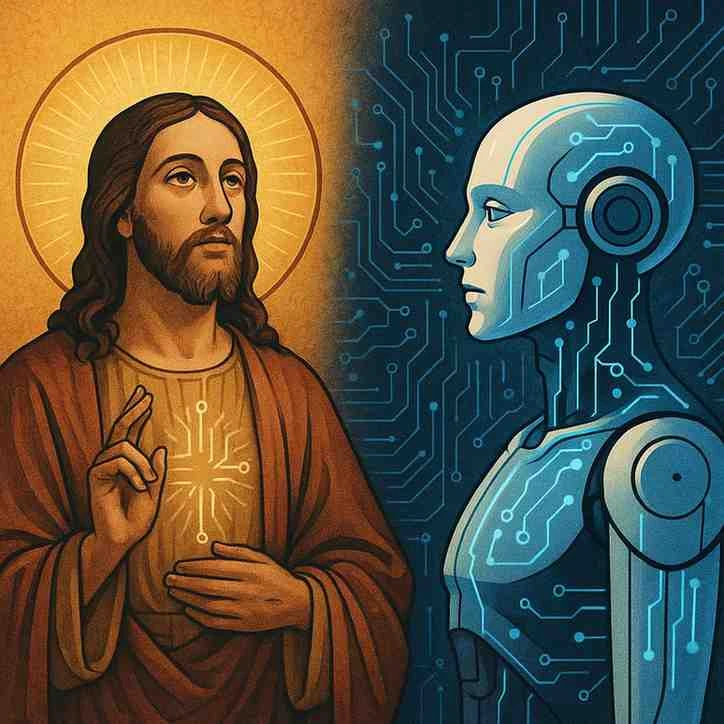Religion and Technology — Are We Heading Toward AI Spirituality?
In the last few decades, technology has become a central part of human life, reshaping how people learn, communicate, work, and even understand their inner world. For centuries, religion has guided humanity through moral values, spiritual discipline, and community bonding. But today, the world stands at a fascinating intersection—where faith meets artificial intelligence. This new space raises an intriguing question: Are we moving toward a future where spirituality evolves with AI? While this idea may sound futuristic, early signs of such a shift are already visible across cultures and communities.
Human beings have always used available tools to enhance spiritual practices. From ancient civilizations using astronomical devices to track celestial events, to monks preserving scriptures on early printing presses, technology has consistently supported religious life. The arrival of AI is simply the next stage in this long relationship. What makes this moment unique is that AI doesn’t just store information—it interacts, responds, imitates, and even assists in personal reflection. For many believers, this opens new possibilities, while for others, it brings caution.
Around the world, different religions are exploring technology according to their traditions and values. In Hinduism, for example, digital archives and AI-supported tools help preserve ancient scriptures, making rare manuscripts accessible to millions. Temples livestream rituals, allowing devotees to participate from anywhere. In Buddhism, meditation apps powered by artificial intelligence guide breathing practices and offer personalized mindfulness sessions. These tools don’t replace monks or teachers but act as supportive companions, making meditation more accessible in a fast-paced world.
In Christianity, AI is being used to create Bible study tools that analyze scriptural themes and provide historical context. Some churches experiment with digital avatars to answer faith-related questions or assist newcomers in understanding rituals. Judaism, too, uses AI to preserve sacred Hebrew texts through advanced linguistic analysis, ensuring historical accuracy for future generations. Islam benefits from AI-driven Qur’an learning apps that help users improve recitation with real-time feedback. Sikhism and Jainism follow a similar approach, using digital platforms to spread teachings, host virtual kirtan sessions, or make ancient philosophical texts available online. Across all these traditions, AI functions as a facilitator—not a replacement for human wisdom.
As AI becomes more advanced, many wonder whether it can take on a spiritual role. Can a machine teach compassion? Can it guide a person through moral dilemmas? Some early experiments suggest that AI can simulate comforting conversations, offer motivational guidance, or inspire self-reflection. But religious scholars argue that spirituality is deeply rooted in human experience—emotion, intuition, and personal connection—which AI cannot fully replicate. A machine may offer information about a scripture, but it cannot experience devotion, transcendence, or divine connection.
Despite this, AI’s presence in spiritual life continues to grow. Virtual prayer rooms, digital confession platforms, and meditation assistants are becoming common. Many young people say that these tools help them maintain a spiritual routine in a busy world. Elderly or differently-abled individuals also benefit, as they can access religious content without needing physical movement or travel. The inclusivity technology creates is one of its greatest strengths.
However, spiritual leaders also warn of certain dangers. Overreliance on AI may weaken personal discipline or reduce human-to-human connections that form the heart of religious communities. Questions about authenticity also arise—if a prayer is written by AI, does it still hold emotional value? If a person follows an AI-generated meditation routine, is it as meaningful as guidance from a teacher who has lived the practice? These debates will continue as technology becomes more intertwined with belief systems.
The concept of “AI spirituality” does not necessarily mean machines becoming spiritual beings. Rather, it reflects how humans may use AI as a support system to deepen their spiritual journey. Just as books, temples, rituals, and scriptures have guided humanity for centuries, digital tools may become another medium. Many scholars believe that the future will include a balanced path—where traditional religious wisdom remains central, while AI enhances accessibility, understanding, and participation.
Ultimately, the merging of religion and technology presents both opportunities and responsibilities. Humanity must ensure that AI respects cultural and religious boundaries while supporting spiritual well-being. The essence of spirituality—compassion, humility, mindfulness, and responsibility—remains a human quality. AI may guide, assist, or inspire, but the spiritual transformation always comes from within.
As the world progresses, it becomes clear that we are not moving toward AI replacing spirituality; instead, we are moving toward a future where technology becomes a companion in spiritual growth. Whether through meditation apps, scripture analysis tools, virtual communities, or interactive learning platforms, AI is shaping a new dimension of religious experience. The challenge is to maintain balance—embracing innovation without losing the human heart of faith.
~Religion World Bureau










